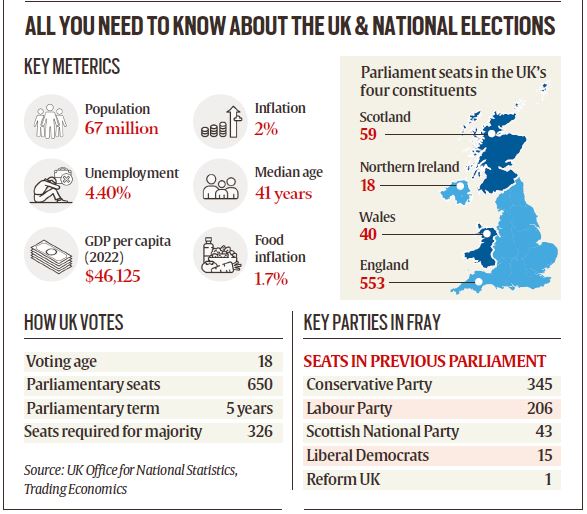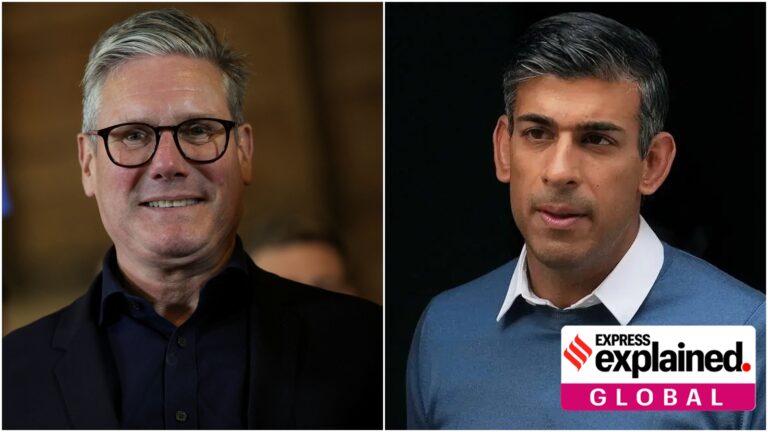Britain votes on Thursday and Keir Starmer’s Labour Party is on track to win a landslide victory, with some opinion polls predicting it will win more than 400 of the 650 seats in the House of Commons, ending 14 years of rule by the Conservative Party (also known as the Tories), currently led by Chancellor Rishi Sunak.
Britain has been in economic turmoil since it voted to leave the European Union in 2016.
The biggest concern for voters right now is the deterioration of living standards: Inflation fell to 2% in May after peaking at 11.1% in October 2022, but real wages continue to fall and food prices remain 20% above their July 2021 levels.
This makes the outgoing Conservative government the first in modern British history to leave Britons worse off than before: According to a report by the think tank Resolution Foundation, household disposable income is expected to fall by 0.9% between 2019 and the end of 2024. The number of people currently relying on food stamps is at an all-time high.
All this has happened amid relentless cuts to public spending during the Conservative government’s 14 years in power. The famous National Health Service (NHS) is in disarray with extremely long waiting times, a decline in the number of GPs, pensions failing to keep up with inflation and social housing literally collapsing.


Conservative Party in turmoil

Brexit also created political uncertainty: Conservative Prime Minister David Cameron, who opposed Brexit, lost his job, and four Conservative prime ministers have since been elected, but none of them lasted more than 38 months in power.
* Sunak’s predecessor at 10 Downing Street, Liz Truss, stepped down on October 20, 2022, after just 49 days in office and a disastrously small budget. The budget came at a time when prices and energy costs were soaring and Britain looked set to enter recession. Truss’ unrealistic “growth plan,” funded by a series of tax cuts, baffled economists and unsettled her party.
* Before Truss, Boris Johnson left office amid a flurry of scandals, including the infamous “Partygate,” in which Johnson and other Conservative members were caught partying at the peak of the coronavirus pandemic while the UK had strict restrictions on large gatherings. Partygate was seen as the final straw for Johnson’s three years in Downing Street. During his time in Downing Street, Johnson faced allegations of cronyism and corruption, including accepting freebies and favours from wealthy Conservative donors and lying about his own actions in Parliament.
* Johnson took over as prime minister on 24 July 2019 after Theresa May, the UK’s first female prime minister, failed to come up with a workable plan for leaving the EU. May, a Brexiteer, took over from Cameron in 2016 promising to reach a beneficial withdrawal agreement with the EU.
* The current chancellor, Mr Sunak, has failed to revive the ailing Conservative party, using illegal immigration as his main issue to distract from his party’s corruption and mismanagement of the economy, but in vain.
His policy of sending illegal immigrants to Rwanda is seen by many Britons as inhumane, giving ammunition to the opposition Labour Party, which has also used Sunak’s reneging on Britain’s climate change pledges to attack him.
In May, Mr Sunak called an early election in response to improving economic performance, but the Conservative campaign failed to impress: a record number of Conservative MPs withdrew from the polls and many switched parties.
Labour’s “change” plan
Ahead of the election, Labour leader Starmer has pledged to be a driver of the change Britain needs, saying his government’s first mission will be to boost economic growth.
According to the Labour manifesto, the party would set up a National Wealth Fund with capitalisation of $9.2 billion and aim to attract £3 of private investment for every pound of public money to support growth and clean energy.
Labour has vowed not to raise taxes on “working people”. There will be no increase in basic, higher or additional rates of income tax, national insurance or VAT. Corporation tax will be capped at the current 25%.
Mr Starmer also claims he will solve the NHS’s problems by adding 40,000 appointments per week, encouraging staff to make extra out-of-hours appointments and tapping into “spare capacity” in the private sector. He has promised to recruit a further 8,500 new staff to treat children and adults.
Starmer has been a vocal critic of Sunak’s immigration policies but has pledged to reduce net immigration by introducing visa limits, training more people to fill domestic shortages and tightening border controls. Labour has pledged to repeal Sunak’s Rwanda policy.
Labour has pledged to create a state-run Great British Energy with $10.5 billion to “partner with energy companies, local authorities and co-operatives to build thousands of clean electricity projects through a combination of onshore wind, solar and hydroelectric projects.” Starmer has said he will expand clean energy by doubling onshore wind, tripling solar and quadrupling offshore wind by 2030.
Labour ‘sells its soul’
Despite Mr Starmer’s extravagant claims, critics say he has “sold the soul of the Labour party” to make it more electable. They say he is a non-ideological figure and will do “whatever it takes” to make Labour more electable.
Under Starmer, the party has abandoned many of its left-wing, working-class traditions and moved towards the centre of the political spectrum.
Starmer replaced left-leaning Jeremy Corbyn in 2020. During the Labour leadership race, he laid out “10 pledges” including reviewing arms sales, taxing the wealthy and nationalising public services. Since taking the helm, Starmer has abandoned most of these pledges. He has also faced backlash for taking a pro-Israel stance amid the ongoing Gaza conflict.
Mr Starmer’s actions have eroded the support of some on the Labour left, with former Labour supporters like Mr Corbyn running as independents, and positions now being filled by Conservative turncoats such as Brexit supporter Natalie Elphick.
Many have compared Starmer to Tony Blair, the former Labour prime minister who led the Labour Party to power in 1997 after 18 years of Conservative rule, who also “reformed” the Labour party to make it “more pragmatic”. But unlike Blair, who enjoyed record approval ratings at the height of his power, public opinion of Starmer remains, and is likely to remain, cold.

